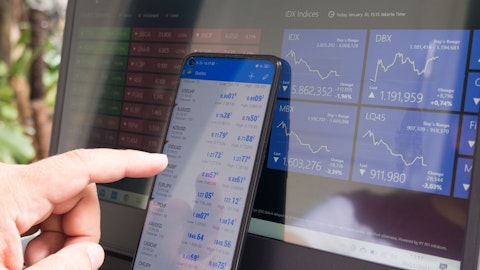Badger Meter, Inc. (NYSE:BMI) Q2 2023 Earnings Call Transcript July 20, 2023
Badger Meter, Inc. beats earnings expectations. Reported EPS is $0.76, expectations were $0.65.
Operator: Ladies and gentlemen, welcome to the Second Quarter 2023 Badger Meter Earnings Conference Call. All lines will be muted during the presentation portion of the call, with an opportunity for questions and answers at the end. [Operator Instructions] As a reminder, today’s conference is being recorded. It is now my pleasure to turn the conference over to Karen Bauer, Vice President of Investor Relations, Corporate Strategy and Treasurer. Please go ahead.
Karen Bauer: Good morning, and thank you for joining the Badger Meter second quarter 2023 earnings conference call. On the call with me today are Ken Bockhorst, Chairman, President and Chief Executive Officer; and Bob Wrocklage, Chief Financial Officer. The earnings release and related slide presentation are available on our website. Quickly, I will cover the safe harbor, reminding you that any forward-looking statements made during this call are subject to various risks and uncertainties, the most important of which are outlined in our press release and SEC filings. On today’s call, we will refer to certain non-GAAP financial metrics. Our earnings slides provide a reconciliation of the GAAP to non-GAAP financial metrics used. With that, I’ll turn the call over to Ken.
Ken Bockhorst: Thanks, Karen, and thank you for joining our second quarter earnings call. We were very pleased with our second quarter performance, delivering an all-time record revenue quarter, strong operating profit margin improvement and 33% EPS growth year-over-year. Demand levels remain resilient with a book-to-bill, again, above 1. I want to thank our global Badger Meter team for their efforts once again delivering exceptional execution and support of our customers. We published our 2022 sustainability report a few weeks ago, and I’ll highlight key elements of our ESG progress in addition to providing an update on the macro environment and market outlook later in the call. For now, I’ll turn it over to Bob to go through the details of the quarter.
Bob Wrocklage: Thanks, Ken, and good morning, everyone. Turning to Slide four. Our total sales in the second quarter were $175.9 million, an increase of 28% compared to the $137.8 million in the same period last year, representing another all-time record sales quarter for Badger Meter. Total utility water product line sales were 32% above prior year levels and increased 14% sequentially from the first quarter, with broad-based increases across the portfolio of utility smart water solution offerings. Strong order demand, sequentially improving supply chain dynamics and ongoing value-based pricing actions benefited sales. Most notably, we experienced higher shipments associated with utility adoption of our differentiated cellular AMI solution, including ORION Cellular endpoints and BEACON Software as a Service.
Additionally, volumes increased inclusive of both mechanical and E-Series ultrasonic meters for residential and commercial applications. Sales for the flow instrumentation product line increased 6% year-over-year, led by solid demand in water-related markets and improved component supply availability, while general industrial end market demand was muted. Turning to margins. We were very pleased with the operating margin expansion of 80 basis points in the quarter reaching 16.8%. Gross profit dollars increased $14.7 million year-over-year, and as a percent of sales, were 39.5%, at the higher end of our normalized range and just shy of last year’s 39.7%. SEA expenses in the second quarter were $39.9 million, an increase of approximately $7 million year-over-year, which included higher personnel-related costs, encompassing headcount, salaries, sales commissions, incentive compensation and travel.
The addition of Syrinix with its related intangible asset amortization also contributed to the increase. Despite the higher spend levels to support growth, SEA as a percent of sales declined 100 basis points to 22.7% from 23.7% in the comparable prior year quarter. The impact of higher interest income year-over-year was partially offset by a modestly higher tax rate of 25.8% in the second quarter of 2023 compared to 24.4% in the comparable prior year period. In summary, consolidated EPS was a record $0.76, a robust 33% improvement from $0.57 in the prior year comparable quarter. Working capital as a percent of sales was 23.4% compared to 23.1% last quarter end and 23.8% at the prior year comparable period. While inventory remains elevated to support growth, we do expect to drive modest strategic inventory reductions in the back half of the year.
Free cash flow was $20.1 million improved from a year ago on higher earnings, partially offset by higher working capital and capital expenditures. We remain on track for 100% plus free cash flow conversion of net earnings for the full year. With that, I’ll turn the call back over to Ken.
Ken Bockhorst: Thanks, Bob. Turning to Slide five. A few weeks ago, we published our 2022 sustainability report, highlighting our progress related to various environmental, social and governance matters. Badger Meter has a long history of working to grow our business and our positive impact on the world by enabling our customers to do the same. With 95% of our revenue stemming from water-related applications, we understand the crucial role of our offerings play in augmenting water efficiency and affordability, reducing water loss, optimizing asset life, promoting sustainability and providing resiliency across the water cycle. At the same time, we strive to reduce our environmental impact by minimizing emissions, energy, waste and water usage in our own operations.
After just two years of strong progress in reducing both our absolute greenhouse gas emissions and related intensity, we exceeded our original goal, paving the way for a new 50% intensity reduction from our 2020 baseline by 2030. We are furthering our competitive advantage by attracting and retaining key talent to support our growth by enhancing our culture where employees are energized by our purpose valued for their contributions, encouraged to share ideas and have opportunities to grow their careers. More than 15% of our workforce was promoted last year with 30% of open roles filled through internal promotions and 17% of roles via employee referrals. We achieved 93% participation in our global engagement survey, resulting in another manufacturing industry Best Places to Work award.
In short, we are committed to increasing shareholder value by delivering both strong financial and ESG performance. Turning to our outlook. I couldn’t be more pleased with our execution, the performance of our team and the opportunities ahead. Despite the more difficult sales comparisons as we look at the back half of 2023, we continue to expect solid year-over-year sales growth, building off the momentum of the first half of the year. Improving supply chain and inflation dynamics bode well for continued gradual margin expansion with gross margins within our normalized range and continued SEA leverage expected. Awards, orders and bid funnel activity remains strong, supported by the well-understood macro drivers facing the water industry. These include workforce retirements and shortages, aging infrastructure, severe weather events and water conservation, among others.
While macroeconomic uncertainty remains as well as the potential for higher interest rates to curb demand in some sectors, the underlying secular drivers within our markets, coupled with replacement-driven activity and recurring software revenue, provide durability to our long-term growth outlook. Before I turn the call over for Q&A, I want to highlight five key reasons we believe Badger Meter remains a compelling investment opportunity. First, we are an industry leader with a differentiated and expanding portfolio of smart water solutions developed through organic investment and acquisitions tailored to address growing customer water challenges. We have favorable secular trends driving multiyear market demand. With cash on hand, strong free cash flow generation and a debt-free balance sheet, we have ample capacity to execute on our capital allocation priorities, investing in R&D, strategic acquisitions and returning cash to shareholders, building on our dividend aristocrat status.
We have positive structural sales mix, coupled with SEA leverage opportunity, which will continue to deliver margin expansion. And last, but certainly not least, we have a tremendous team committed to serving customers and engaged in driving exceptional results. With that, operator, please open the line for questions.
See also 15 Most Dangerous Cities in Mexico and 25 Best Sports Stadiums in the World.
Q&A Session
Follow Badger Meter Inc (NYSE:BMI)
Follow Badger Meter Inc (NYSE:BMI)
Receive real-time insider trading and news alerts
Operator: [Operator Instructions] Our first question today comes from the line of Nathan Jones from Stifel. Please go ahead Nathan, your line is now open.
Nathan Jones: Good morning, everyone. Maybe just starting up on the topline here. Obviously, very strong and you guys are still talking about book-to-bill above 1, which suggests a very strong and growing market here. Is there any reason why we shouldn’t expect the run rate in the second quarter revenues to continue on a quarterly basis going forward?
Ken Bockhorst: Well, Nathan, at a high level, we’ve talked for a long time, years now really about the macro drivers in the industry, the continuing and growing acceptance and just believe that AMI is the absolute way to go within metering, the dynamics around water quality, the acquisition of Syrinix and the early benefits we’re seeing of bundling these things together. We have felt great about our markets for a very long time. And coupled with our — we feel, certainly strongly about best-in-class execution, we expect to continue to be able to drive growth on a consistent basis.
Nathan Jones: You’ve talked before — we’ve talked before about 6 million meters going out into the market every year. Do you think that number has changed? Like is there any reason to think that utilities are being more proactive in the replacement to adopt AMI because of all of the secular issues the industry has with labor shortages and things like that, or is this primarily driven by higher ASPs moving to higher technology?
Ken Bockhorst: Yes. So it’s primarily driven by the higher ASPs as people adopt the technology, and they’re buying a radio with a meter when they’re in the replacement cycle and then adding on to that, our BEACON software. So it’s a higher ASP of the bundle. And additionally, I would point out what’s unique about our product offering with cellular for AMI, someone can buy just radios without even having to replace the meter in our offering. So it isn’t like those two things are tied together with our ORION Cellular portfolio of communications. So I guess I don’t — we don’t feel that — in short, we don’t feel that the meter volumes in total are growing. And if so, it’s not important. It’s not — it’s minimal.
Nathan Jones: So that would then suggest that you don’t need additional CapEx for additional capacity. You don’t need a huge amount of more SG&A to support this kind of thing because you’re selling kind of the same number of units. The mix is just shifting up.
Ken Bockhorst: So let me just answer that in general, and then I think Bob might want to add to it. But we as — our continuous improvement culture, we’re consistently working on operational improvements that lead to increased output. We consistently make investments in equipment and product lines and machinery to continue to grow our capacity. I mean we — with the growth that we’ve had over the last several years, I think you’d clearly understand, we’ve made investments and improvements along the way. I’ll let Bob talk about the future of investments. But we’ve — I think we’ve been able to do it pretty much under the radar to you.
Bob Wrocklage: Yes. I would just take those probably out of a different order than you asked them. I’ll start with SEA leverage, I think. Our message there has been consistent for a long period of time that we can continue to leverage SEA as sales grow just because of the average sell price dynamic and exactly what you alluded to. So I don’t think that’s a new story for us. In fact, you’ve really seen that play out in spades over the last six quarters, quite frankly. The second piece, yes, Ken is exactly right. This isn’t the first period of growth for this company. We’ve been growing for a long time, and we’ve continuously looked at both OpEx-related CapEx and then growth-related CapEx over the years, and we’ve responded to increased volumes ever since the dawn of time.
And so we’ll continue to do that. Obviously, the current landscape with the backlog where it is and our growth aspirations clearly, have us looking at capacity, probably more directly than we have in the past, but that doesn’t necessarily mean a market change in CapEx, but we’ll continue to be prudent in those investments and pivot and shift as the market evolves.
Ken Bockhorst: Yes. And let me follow on to one other point there because you said generally our volumes remain the same. That’s true in meters. That is not true in radios. Every quarter, for the last several years, we’ve been talking about increased sales in BEACON radio. So the radio volume is growing sequentially every quarter. And the key to remember about that is that also then has the 100% attachment rate to BEACON Software as a Service.
Bob Wrocklage: And even within a more or less static metering volume, you’ve got shifts in technology that require different manufacturing processes and assembly tables in areas. So it’s not as if just holding the volume constant doesn’t mean there aren’t investments or expansions needed as you trade up one for another.
Nathan Jones: Makes sense. Thanks very much for taking my questions.
Operator: The next question today comes from the line of Andrew Krill from Deutsche Bank. Please go ahead, Andrew, your line is now open
Andrew Krill: Thanks. Good morning, everyone. I think I wanted to follow up on the sales results, which were impressive. And I just wanted to check, like was there any, in your view, meaningful backlog execution or kind of like major onetime projects that helped the results and are kind of not going to be repeating looking forward?
Ken Bockhorst: No. So if you recall, if our orders were greater than our sales, so this growth did not come from eating down any backlog, in fact, it slightly grew. So it’s not backlog execution and there’s not any one-off projects that would be meaningful that you need to think about as you model.
Andrew Krill: Okay. Great. Makes sense. And just secondly, I kind of see you don’t give guidance, but just any color you’re willing to provide on like how July is trending maybe between utility water and flow instrumentation?
Ken Bockhorst: So Andrew, I know you’re pretty new to us, and that was a nice try, but we’ll never talk to you about months. So we don’t provide guidance. And frankly, there’s a really good reason for it, and it’s because we don’t feel like it really provides value for investors for us to give a quarterly guidance. Our customers think in 10-, 15-, 20-year cycles. We run our business from a very long-term strategic view. We certainly execute and we strive to deliver fantastic quarters every quarter. But we really do think for the long term. And whatever I would tell you in July would be meaningless to the future of what we’re doing here.
Andrew Krill: Okay, great. All makes sense. I’ll pass it on. Thank you.
Operator: [Operator Instructions] Our next question today comes from the line of Rob Mason from Baird. Please go ahead Rob, your line is now open.
Rob Mason: Yes, good morning. Ken, I hear what you’re saying about no large onetime or large revenue items in the quarter. But as you think about the bookings in your order funnel, that’s even more than keeping pace with the revenue despite it stepping up. I’m just curious how that has evolved over the last 12 months? Are you seeing larger projects start to free up that maybe were bogged down in the deliberation process during COVID, or are we still just — it’s just a lot of singles and doubles in the order funnel?
Ken Bockhorst: There are still a tremendous number of singles and doubles. And of course, there are some home runs that come in. But for the most part, that mix of what’s in our bid funnel, mix of what’s in our backlog, mix of what we’re shipping has not changed in any way meaningfully with 50,000 — more than 50,000 utilities in the U.S. of varying sizes. I think what we’ve been able to do over the last several years with our portfolio and the acquisitions of bringing water quality in is we’ve been able to participate in more of the home runs than we used to with our differentiated portfolio. So I think that’s really probably the difference is that we can hit for average and power.
Rob Mason: Very good. Just to go to the gross margin, again, I think as you had previewed this year, you’ve been emphasizing maybe more SEA leverage than over gross margin leverage as the year unfolds. But I’m just curious, given the revenue volume, it all sounded favorable from a mix standpoint. If there are anything going against you just maybe the underlying sales mix or FX in particular? Is there anything that would be keeping that flattish sequentially on higher volume?
Ken Bockhorst: So let me take a first general statement about mix in general. The positive structural sales mix that we have in average ASP drives with some conversion to mechanical ultrasonic conversion to adding radios, the 100% attachment rate of software, the structural mix elements are durable and positive, and that will continue long into the future. We may have some mix within a quarter you just pointed out the impact sometimes of projects and other things. So there might be some slight mix within a quarter. But overall, the positive sales mix trend is long lasting.
Bob Wrocklage: Yes. And I think we’re not at all apologetic about being in the upper end of our normalized range here now on a sustained basis. The reality is, as we’ve always talked about, multiple times. In any given quarter, there’s a variety of factors that play out in our margin, whether that’s mix, price cost, mix of metering technologies, mix of customers, mix of installation pass-through. So there’s a lot going on there. I don’t — again, I feel very confident of the performance we had, and we’re extremely pleased with that. And we expect while there’s certainly been some signs of moderating inflation relative to peak levels, they’re still inflation present, and we’re still continuing to execute on the value-based pricing actions as well as what I’ll call more mechanical price realization because we’re still in an inflationary environment.
Rob Mason: Understood. And maybe just one last follow-up. Around SEA expenses, that increased sequentially as well. Was there anything you’d call out is more onetime in nature? I don’t — sometimes health care or legal costs, or I don’t know if incentive comp had to step up with the performance in the quarter? Or is that a run rate to think about for the balance of the year?
Bob Wrocklage: Yes. I would say the diagnosis of the step change, whether you’re looking year-over-year or first quarter to second quarter is all those things we had listed out in the script. I mean there’s always modest things that don’t recur of a small nature, but nothing significant.
Rob Mason: Very good. Thank you.
Operator: There are no additional questions waiting at this time. So I’d like to pass the conference back over to Karen Bauer for any closing remarks.
Karen Bauer: Great. Thank you, operator, and thanks, everyone, for joining our call today. For your planning purposes, our third quarter 2023 call is tentatively scheduled for October 19. I’ll be around all day to take any follow-up questions you have. Have a great day.
Operator: This concludes today’s conference call. Thank you all for your participation. You may now disconnect your lines.
Follow Badger Meter Inc (NYSE:BMI)
Follow Badger Meter Inc (NYSE:BMI)
Receive real-time insider trading and news alerts






